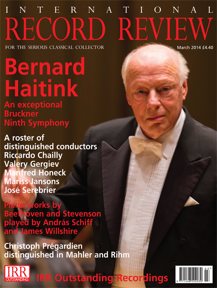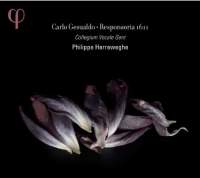Texte paru dans: / Appeared in:
*

International Record Review - (03//2014)
Pour
s'abonner / Subscription information
PHI
LPH010

Code-barres / Barcode : 5400439000100 (ID369)
Excerpts:
Herreweghe’s group is rather smaller than it sounds. Although there are just two voices on the altus , quintus and tenor parts and three each on the others, the sound is unmistakably a choral one. Both rhythmic and harmonic contours are a little blurred compared with the Taverners (and of course the Hilliards). There can be no question either of Gesualdo’s harmonies ringing out with quite the purity the smaller ensembles achieve or of his rhythmic audacities packing quite the same punch as when singers have the chance to shape their lines indivually. For all Herreweghe’s proven skill at finding a convincing choral blend, and for all the excellence of these singers, the consistently beautiful result tends towards the monochrome. He does not yield to the temptation to vary his forces for the ‘verse’ sections of the motets but there would surely have been no serious harm in doing so, certainly for the listener. (The basses sometimes add lower notes at the cadences debatably the prerogative of the species.)
Herreweghe does not always find an ideal flow for the music. Tempo and phrasing here are, to be fair, no easy matter — these pieces move sometimes in minims and sometimes in semiquavers and only a very careful choice of tempo can allow for the extremes of texture to be adequately rendered without the need for jarring tempo changes. Herreweghe’s approach often leans towards a pragmatic four-in-the-bar manner (the ‘bars’ are those of modern editions, of course). The result is somewhat rigid compared with the more fluid two-in-the- ‘bar’ approach of the Hilliards and Taverners. Herreweghe finds differences in dynamic between sections but on the local level things are distinctly underphrased and even some relatively audacious harmonic shifts are skated over, which is certainly a radical new approach for this composer — even such normally chilling moments as ‘et ego vadam’ and ‘tenebrae factae sunt’ sound bizarrely unatmospheric. The breaks between and within pieces are sometimes evened out, making the overall flow of the recording somewhat undifferentiated. It is rare to hear Gesualdo sound quite as unmadrigalian ( indeed undramatic) as Herreweghe presents him — it is certainly an interesting and in its own way daring viewpoint but I cannot say that I am eager to repeat the experience.
Cliquez l'un ou l'autre
bouton pour découvrir bien d'autres critiques de CD
Click either button for many other reviews


